UIC Distinguished Professors
Recognizing extraordinary scholarship in the College of Engineering
intro text
The title of UIC Distinguished Professor is one of the highest academic honors for faculty at the University of Illinois Chicago. It recognizes faculty members who have had a significant impact on their field through scholarship, creativity, and leadership.
In 2019, the College of Engineering created a public lecture series titled Reflections to recognize each new UIC Distinguished Professor from the College. Faculty members who are elevated to this rank deliver a spoken memoir of a research career, looking back at the science, pivotal moments, and collaborations that led to their present achievements. Reflections lectures are meant to be broadly accessible to a scientific audience. They bring together the entire College community to celebrate the work of colleagues and to set an aspirational bar for all.
The inaugural Reflections lecture was held in March 2019. Expand the sections below to read the biographies of College of Engineering faculty who have received distinguished professorships.
Distinguished Professor Biographies
bio
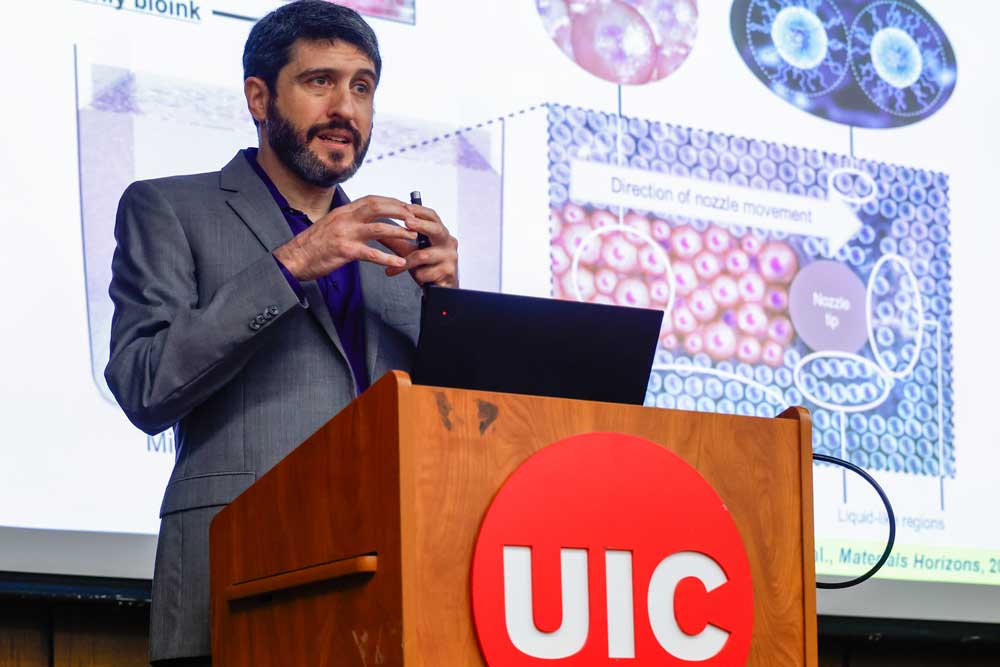
Eben Alsberg, Biomedical Engineering
Distinguished professorship awarded: 2024
Eben Alsberg serves as the Director of the Alsberg Stem Cell and Engineered Novel Therapeutics (ASCENT) Laboratory. He was previously a professor at Case Western Reserve University in the Departments of Biomedical Engineering and Orthopaedic Surgery from 2005 to 2018 and was recruited as a UIC President’s Distinguished Hire in 2019. He also holds appointments with the departments of Mechanical and Industrial Engineering, Pharmacology and Regenerative Medicine, and Orthopaedics. Alsberg was named a Richard and Loan Hill Professor in 2019. He has now been elevated to become the first Richard and Loan Hill Chair in the biomedical engineering department.
Alsberg’s research focuses on engineering functional biologic replacements to repair damaged or diseased tissues in the body. Complex signals implicated in tissue morphogenesis, repair, and homeostasis are used as inspiration for the development of innovative biomaterials for tissue regeneration. Through the precise temporal and spatial presentation of soluble bioactive factors, mechanical forces, and biomaterial physical and biochemical properties, his lab aspires to create microenvironments that regulate cell gene expression and new tissue formation. He has more than 30 patents issued or pending in the fields of biomaterials and tissue engineering.
He received his Bachelor of Science in Engineering in biomedical engineering and in mechanical engineering and material science from Duke University. He received Master of Science in Engineering degrees in mechanical engineering and biomedical engineering from the University of Michigan, and he then received his PhD in biomedical engineering also from the University of Michigan in 2002. Alsberg then worked as a Postdoctoral Research Fellow in the Vascular Biology Program at Harvard Medical School.
Alsberg’s work has been recognized with the Senior Scientist Award from the Tissue Engineering and Regenerative Medicine International Society, the Biomedical Engineering Departmental Faculty of the Year Award for the UIC College of Medicine, the UIC University Scholar Award, the Biovalley Young Investigator Award from the Tissue Engineering Society International, the Ellison Medical Foundation New Scholar in Aging Award, the Crain’s Cleveland Business Forty Under 40 Award, the Technion Lady Davis Fellowship, a Visiting Professorship at Kyung Hee University, and election as a fellow of the American Institute for Medical and Biological Engineering and of the Biomedical Engineering Society.
bio
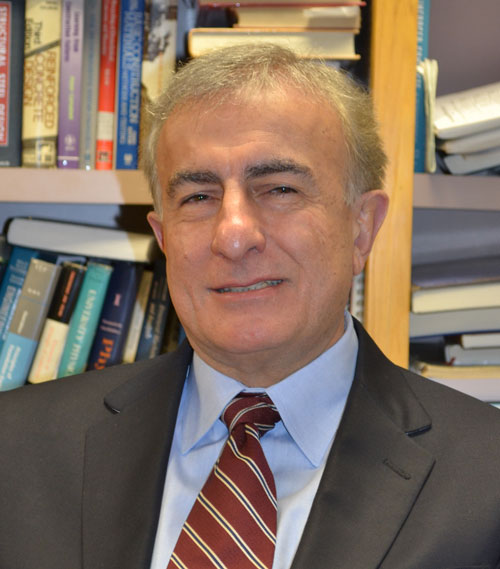
Christopher B. and Susan S. Burke Chair, Civil and Materials Engineering
Distinguished professorship awarded: 2014
Dr. Farhad Ansari is a UIC distinguished professor and the holder of Christopher B. and Susan S. Burke chair in the Department of Civil and Materials Engineering, where he was head from 1999 to 2014. He is acknowledged as the pioneer in applying optical fiber sensors for structural health monitoring and has consulted on and designed structural monitoring systems for bridges around the world, including New York’s Brooklyn Bridge; Lingotto Bridge in Turin, Italy; New York’s Manhattan Bridge; several cable-stayed bridges in China; and numerous other bridges in the United States, including the Kishwaukee Bridge and Thornton Quarry Bridges in Illinois.
Dr. Ansari completed his doctoral work in civil engineering at UIC after earning his master’s degree from the University of Colorado and his bachelor’s degree from the University of Illinois at Urbana-Champaign. Prior to joining UIC’s College of Engineering faculty, he was a faculty member at the New Jersey Institute of Technology from 1983 to 1998. Dr. Ansari focuses his research on intelligent infrastructure, civil structure rehabilitation, and bridge monitoring through sensors and nondestructive testing. He has authored more than 300 journal articles, book chapters, and conference papers. He holds three patents and has edited eight books, and he is editor-in-chief of the Journal of Civil Structural Health Monitoring. In addition, he is an accomplished teacher and mentor, having directed 21 dissertations, overseen 17 master’s degree candidates, and hosted 28 postdoctoral researchers and visiting scholars, including four Fulbright fellows.
Dr. Ansari served as president of the International Society for Structural Health Monitoring of Intelligent Infrastructure (ISHMII) from 2009-2013. He is a fellow of ISHMII, member of advisory board of the National Cooperative Highway Research Program (NCHRP), and the recipient of the 2018 Aftab Mufti Medal for achievements in civil structural health monitoring from the International Society for Health Monitoring of Intelligent Infrastructure.
Isabel Cruz
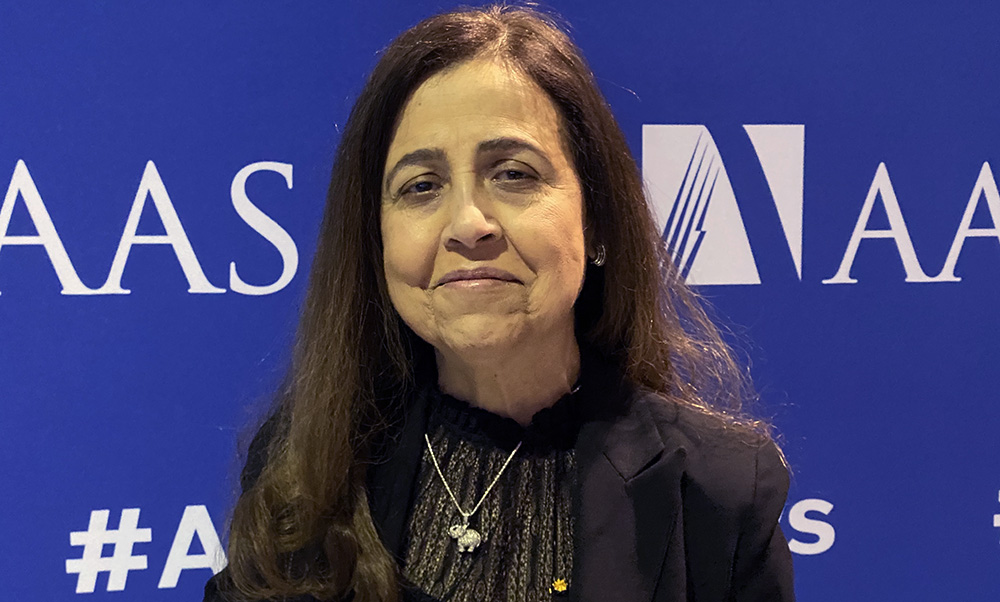
Isabel F. Cruz is a UIC distinguished professor and a professor of computer science. She holds a PhD in computer science from the University of Toronto.
Her research interests include big data, artificial intelligence, geographic information systems, information visualization, and computer security. She has made pioneering contributions to visual query languages, graph query languages, information integration, and information visualization.
Professor Cruz is a Fellow of the American Association for the Advancement of Science. She received an NSF CAREER Award in 1996. She was recognized as University of Illinois Scholar from 2011 to 2014 and as UIC Distinguished Researcher of the Year in natural sciences and engineering in 2017. She was appointed member of the Mapping Science Committee of the National Academies from 2004 to 2006.
She has published more than 140 research papers. Her open source ontology matching systems, AgreementMaker and AgreementMakerLight, have dominated a competitive field since 2009 and received the IBM research prize in 2017.
Professor Cruz has been Program Committee chair 17 times, including of top conferences in her areas of expertise, namely IEEE ICDE, ISWC, and ACM SIGSPATIAL. Her work has been supported by grants from NSF, ARDA/IARPA, NIH, the Bill & Melinda Gates Foundation, and the Bloomberg Philanthropies.
She has introduced new courses in the data science curriculum at UIC, namely Introduction to Data Science, Big Data Mining, and Data and Web Semantics (Knowledge Graphs). She contributed to the NSF-funded WISEST (Women in Science and Engineering System Transformation) project at UIC from 2003 to 2012.
bio
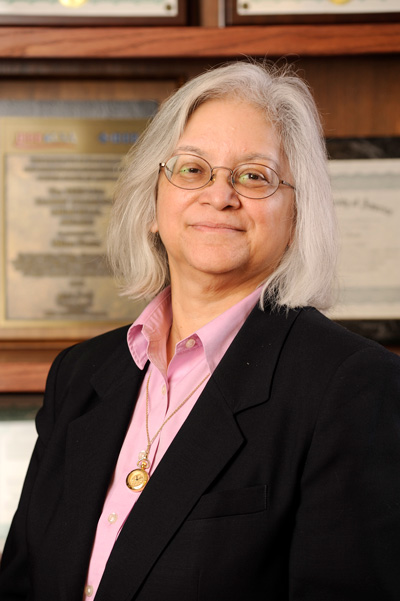
UIC Distinguished Professor, Electrical and Computer Engineering
Distinguished professorship awarded: 2004
Mitra Dutta is a professor in the electrical and computer engineering department with adjunct appointments in physics and in civil, materials, and environmental engineering. She came to the University of Illinois Chicago in 2001 as head of the ECE department, a role that she held until January 2012. From February 2012 to September 2018, she served as UIC’s vice chancellor for research.
Dr. Dutta’s research has focused on electronic and optoelectronic devices as well as the physics of these materials and device structures. She has authored or co-authored more than 570 publications and presentations, holds 30 U.S. and Canadian patents, has co-edited six books, and is a co-author on two. At UIC she has graduated 14 students, 13 with PhDs and one with a master’s degree; all have gone on to successful research careers in industry or government labs. She also has supervised eight postdocs: four at UIC and four NRC postdocs at the U.S. Army Research Laboratory.
After receiving her PhD from the University of Cincinnati and holding postdoctoral appointments at Purdue University and the City College of New York and a visiting researcher position at Brookhaven National Laboratory, Dr. Dutta joined the U.S. Army Research Laboratory first as team leader of the Optoelectronics Team, then as branch chief, and finally as division director of the Physics Division.
In 1996, she moved to the U.S. Army Research Office, where she ran the Electronics Division. In 1999, she was promoted to the Senior Executive Service as director of the Research Technology and Integration Directorate, having oversight over the Army’s entire extramural basic research budget of $310 million. In that capacity, she also oversaw the Army’s Small Business Program, Historic Black University/Minority Institutions Programs, the Army research offices at London and Tokyo, and youth outreach programs such as the U.S. Math Olympiad.
Dr. Dutta is a fellow of the APS (2013), fellow of the AAAS (2002), and fellow of SWE (2003). She received the National Achievement Award from the Society of Women Engineers in 2003 and in 2000 became the only woman to receive the IEEE-USA Harry Diamond Memorial Award in the award’s 65-year history. Dr. Dutta also is a fellow emeritus of the Army Research Laboratory (2000), a fellow of the IEEE (1999), and a fellow of OSA (1998).
bio
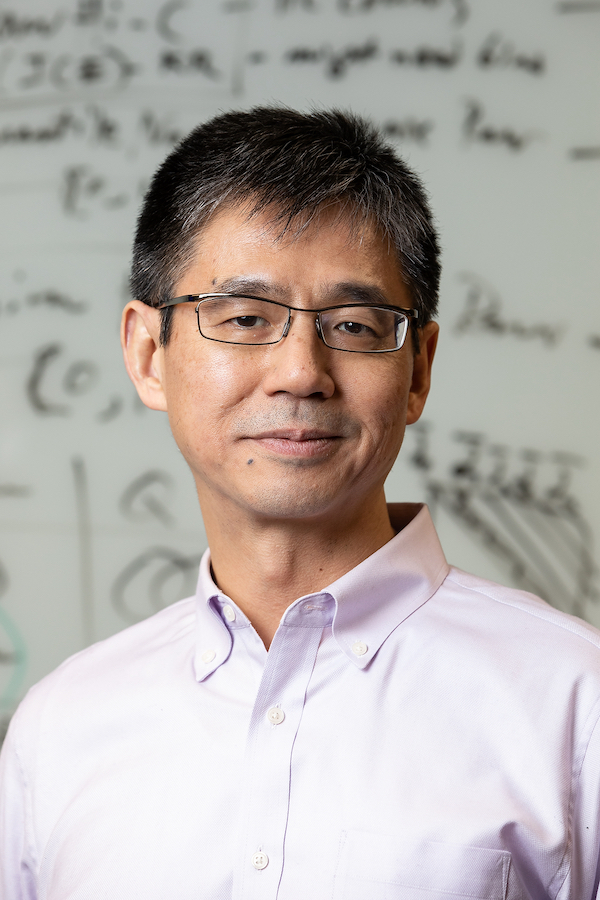
UIC Distinguished Professor / Richard and Loan Hill Professor, Biomedical Engineering
Distinguished professorship awarded: 2021
Jie Liang has developed powerful algorithms for computing exact probability landscapes of stochastic networks, 3D-folding of ensembles of single-cell chromatin, protein surface analysis and function prediction, and membrane protein biophysics. He was a driving force in establishing UIC’s PhD and MS programs in bioinformatics in 2003, and, as of his election to distinguished professor in 2021, he had mentored 21 PhD students, including leaders in academia — including at Washington University and Columbia University — and in the biotech industry. In 2019, he brought the IEEE biomedical informatics flagship conference to UIC as conference chair.
bio
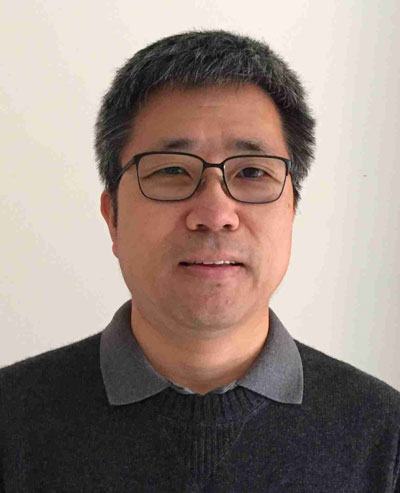
UIC Distinguished Professor, Computer Science
Distinguished professorship awarded: 2017
Bing Liu is a distinguished professor of computer science at the University of Illinois Chicago. He received his PhD in Artificial Intelligence (AI) from the University of Edinburgh. Before coming to UIC, he was a faculty member at the School of Computing, National University of Singapore. His research interests include sentiment analysis, lifelong learning, chatbot, natural language processing (NLP), data mining, machine learning, and AI.
Dr. Liu has published extensively in top conferences and journals. Three of his papers have received Test-of-Time awards: two from SIGKDD (ACM Special Interest Group on Knowledge Discovery and Data Mining) and one from WSDM (ACM International Conference on Web Search and Data Mining). He is also a recipient of the ACM SIGKDD Innovation Award, the group’s most prestigious technical award. Dr. Liu has authored four books: two on sentiment analysis, one on lifelong learning, and one on Web mining. Some of his work has been widely reported in the international press, including a front-page article in The New York Times.
In the area of service to the profession, Dr. Liu served as chair of ACM SIGKDD from 2013 to 2017; program chair of many leading data mining conferences, including KDD, ICDM, CIKM, WSDM, SDM, and PAKDD; associate editor of leading journals such as TKDE, TWEB, DMKD and TKDD; and area chair or senior PC member of numerous NLP, AI, Web, and data mining conferences. He is a fellow of the ACM, AAAI, and IEEE.
bio
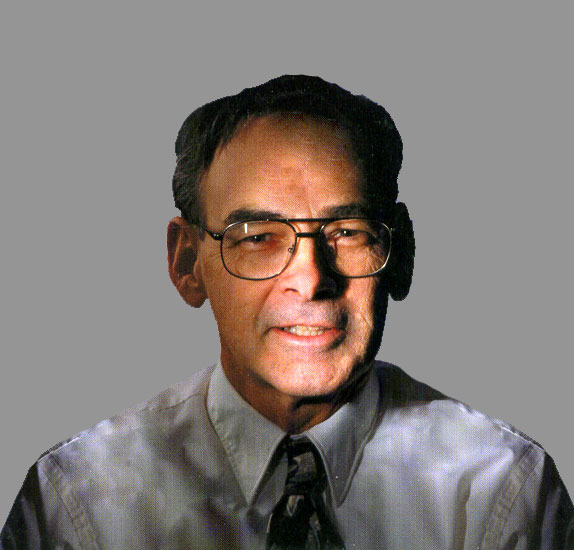
UIC Distinguished Professor, Richard and Loan Hill Department of Bioengineering
Distinguished professorship awarded: 2010
Richard L. Magin (IEEE M’69–SM’81–F’96) received his BS and MS degrees in physics from the Georgia Institute of Technology in 1969 and 1972, respectively. He received his PhD degree in biophysics from the University of Rochester in 1976. Dr. Magin was a postdoctoral student in the Laboratory of Chemical Pharmacology of the National Cancer Institute (NIH) from 1976 to 1979. From 1979 to 1999 he was an assistant, associate, and then full professor of electrical and computer engineering at the University of Illinois at Urbana-Champaign. He came to the University of Illinois Chicago in 1999 to become head of the Department of Bioengineering, a position he held until 2009. In 2010, he was appointed Distinguished Professor in the Richard and Loan Hill Department of Bioengineering.
Dr. Magin’s research interests focus on the application of magnetic resonance imaging in science and engineering. He served as editor for the journal Critical Reviews in Biomedical Engineering from 2005 to 2010. He is a member of the Institute of Electrical Engineering (IEEE), the Biomedical Engineering Society, and the International Society of Magnetic Resonance in Medicine. He is a fellow of the IEEE and of the American Institute for Medical and Biological Engineering. In 2005, he received a Fulbright award for research and teaching in Kosice, Slovakia.
Sudip K. Mazumder
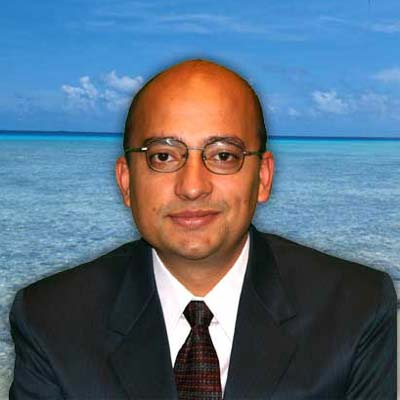
Sudip K. Mazumder received his Ph.D. degree from Virginia Tech in 2001 and his M.S. degree from Rensselaer Polytechnic Institute (RPI) in 1993. He has over 30 years of professional experience encompassing academia and industry. He is a Fellow of the Institute of Electrical and Electronics Engineers (IEEE), Fellow of the American Association for the Advancement of Science (AAAS), and a Fellow of the Asia-Pacific Artificial Intelligence Association (AAIA). He has made original contributions to the areas of control of power-electronic systems at the semiconductor device level for numerous and wide-ranging applications in commercial and defense space; high-frequency-link power electronics, including hybrid-modulation-based pulsating-dc-link inverter and differential-mode-converter topologies for applications encompassing but not limited to renewable and alternative energy, electric vehicles, solid-state transformer, energy storage, and offshore wind; discretized high-frequency and Boolean energy and data transfer; and optically-controlled power semiconductor devices and power electronics.
He served as a Distinguished Lecturer for the IEEE Power Electronics Society. Currently, he serves as the Editor-at-Large for IEEE Transactions on Power Electronics, the leading journal in power electronics. He has also served as the Guest Editor-in-Chief / Editor for IEEE Transactions on Power Electronics, IEEE Transactions on Industrial Electronics, and IEEE Journal of Emerging and Selected Topics in Power Electronics, and as the First Editor-in-Chief for Advances in Power Electronics. He serves as an Administrative Committee Member and a Member at Large for the IEEE Power Electronics Society. He served as the General Chair for the 14th International Symposium on Power Electronics for Distributed Generation Systems and serves as the Co-Chair for the 14th IEEE Energy Conversion Congress and Exposition. He also served as a Chair for the IEEE Power Electronics Society’s Technical Committee on Sustainable Energy Systems for six years.
Dr. Mazumder received several IEEE awards/honors including the IEEE Power & Energy Society’s Ramakumar Family Renewable Energy Excellence Award and IEEE Transactions on Power Electronics Prize Paper Awards. He is the recipient of prestigious awards at UIC including the Distinguished Researcher Award in Natural Sciences and Engineering, Inventor of the Year Award, and the University Scholar Award. Earlier, he received the prestigious U.S. Office of Naval Research (ONR) Young Investigator Award and the U.S. National Science Foundation (NSF) CAREER Award. He was a National Merit Scholar in India.
bio
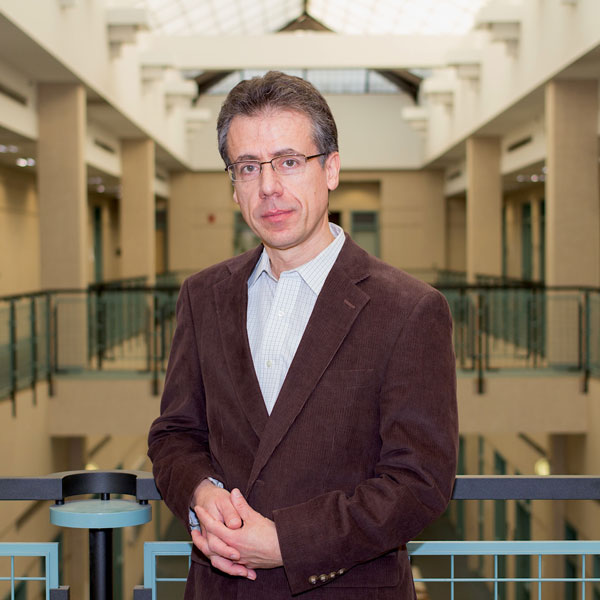
UIC Distinguished Professor, Mechanical and Industrial Engineering
Distinguished professorship awarded: 2018
Reflections lecture date: March 18, 2019 (click here to watch)
Constantine (Dino) Megaridis was born and raised in Greece, where he received his BS degree in mechanical engineering from the National Technical University of Athens (Εθνικό Μετσόβιο Πολυτεχνείο). He subsequently came to the United States, where he received his MS in applied mathematics and his PhD in fluid/thermal sciences, both from Brown University.
Dr. Megaridis joined the University of Illinois Chicago in 1990 after spending two years as a postdoc at the University of California, Irvine. He is a fellow of the American Physical Society and the American Society of Mechanical Engineers and an associate fellow of the American Institute of Aeronautics and Astronautics. He was named UIC Inventor of the Year in 2015 and University of Illinois Scholar in 2012. He also was awarded the 1997 Kenneth T. Whitby Award of the American Association for Aerosol Research.
Dr. Megaridis has received teaching awards at UIC, and in 2018 he was appointed University Distinguished Professor. He is presently the director of the Micro/Nanoscale Fluid Transport Laboratory at UIC. His former doctoral advisees hold faculty positions at various prestigious institutions around the globe, or staff positions in industry or government laboratories in the United States. He has published more than 120 journal papers and 200 conference papers, and he holds several patents. His research has received continuous funding support from numerous federal and industrial sources. His current research interests focus on fluid/particle transport, multifunctional coatings and interfacial phenomena relevant to micro and nanotechnologies.
Abolfazl Mohammadian
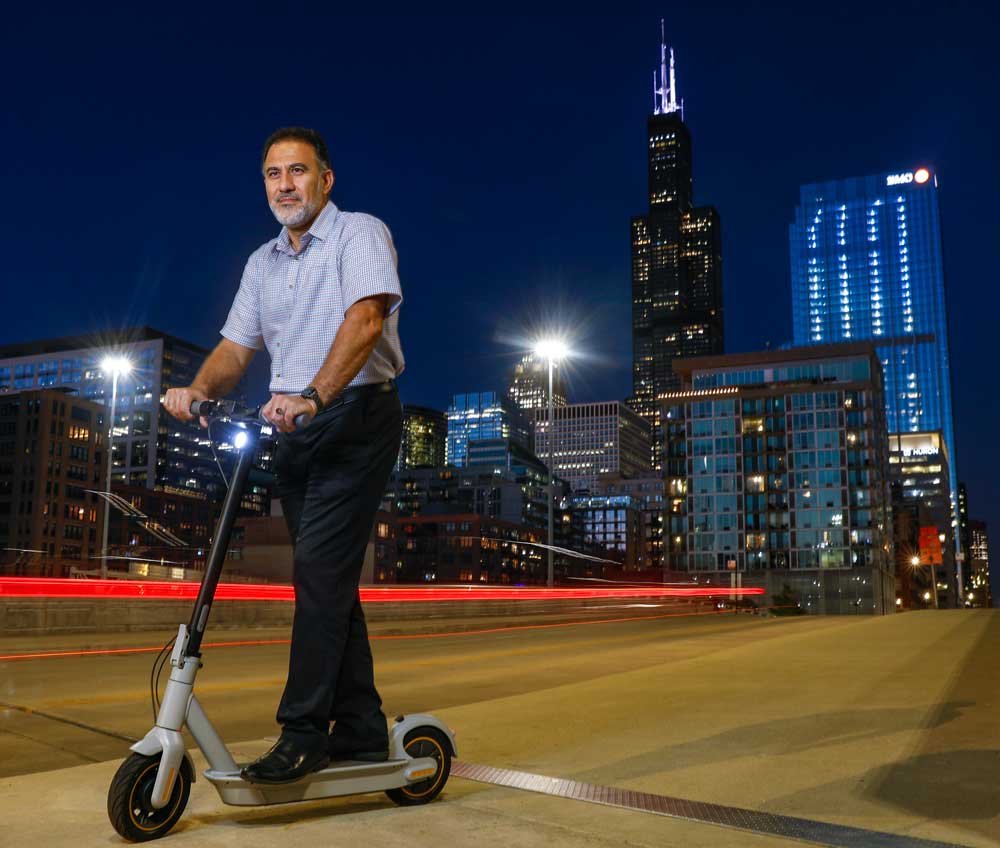
Abolfazl Mohammadian, Civil, Materials, and Environmental Engineering
Distinguished professorship awarded: 2024
Abolfazl (Kouros) Mohammadian is a professor of transportation systems and head of the Department of Civil, Materials, and Environmental Engineering. He received his PhD from University of Toronto in 2002 and has been at UIC since 2003.
Mohammadian’s research covers various areas of transportation systems including travel behavior analysis, travel surveys, computational analysis of transportation systems, freight and logistics modeling, and agent-based microsimulation models. He has authored or co-authored more than 300 scholarly publications in scientific journals, conference proceedings, book chapters, and reports. He is an editor of the Journal of Transportation Letters and has served as committee chair of the Traveler Behavior and Values committee (ADB10) of the National Academies’ Transportation Research Board. He chaired two Transportation Research Board subcommittees: Behavioral Processes (ADB10-4) and New Technologies in Travel Surveys (ABJ40-4).
Mohammadian has received the Ryuichi Kitamura Paper Award, Fred Burggraf Award, and Charley V. Wootan Award, recognizing his contributions to transportation research. He has advised 22 PhD students and has received the Harold Simon Teaching Award, Teaching Recognition Program Award, and the Edmund M. Burke Outstanding Faculty Award, along with the UIC College of Engineering’s faculty teaching, advising, and research awards. Mohammadian served as the vice chair of the University of Illinois Senate Conference and as vice chair of UIC’s Senate for several years.
bio
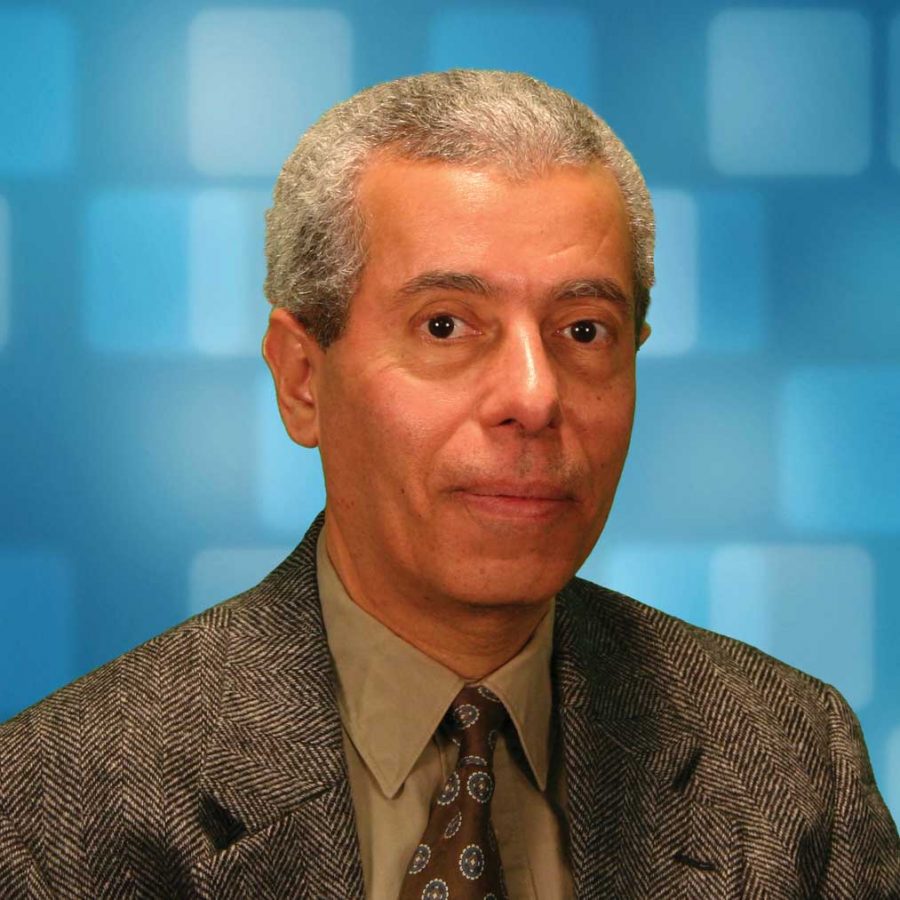
Richard and Loan Hill Professor of Engineering and UIC Distinguished Professor, Mechanical and Industrial Engineering
Distinguished professorship awarded: 2009
Ahmed A. Shabana is a Richard and Loan Hill Professor of Engineering at the University of Illinois Chicago. He received his BSc degree from Cairo University (Egypt), MSc degree from Ain Shams University (Egypt), and PhD degree from the University of Iowa.
Dr. Shabana joined the University of Illinois Chicago in 1983, where he has been teaching and introducing courses in the area of computational mechanics, dynamics, and vibration. He has supervised the work of 47 PhD students and more than 80 postdoctoral fellows and visiting scholars. He is the author of more than 250 refereed journal papers. Dr. Shabana is the author of several books and serves on the editorial board of several journals. He served as chair of the ASME Design Engineering Division, founding chair of the ASME Technical Committee on Multibody Systems and Nonlinear Dynamics, and founding chair of the ASME International Conference of Multibody Systems, Nonlinear Dynamics, and Control.
Dr. Shabana is a fellow of the American Society of Mechanical Engineers (ASME) and the Society of Automotive Engineering (SAE International). His awards include the Humboldt Prize, the Fulbright Research Scholar Award, the ASME D’Alembert Award, the ASME Robert E. Abbott Award, and honorary doctorate, honorary professorship, and best paper awards, as well as several teaching and research awards from the University of Illinois Chicago.
bio
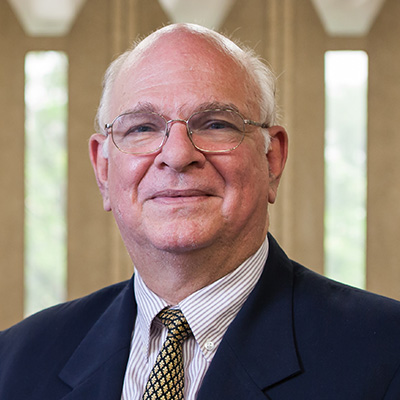
Richard and Loan Hill Professor of Engineering and UIC Distinguished Professor, Department of Electrical and Computer Engineering and Richard and Loan Hill Department of Bioengineering
Distinguished professorship awarded: 2014
Michael Stroscio has served on the faculty of the Department of Electrical and Computer Engineering and the Richard and Loan Hill Department of Bioengineering at UIC since 2001. He also holds an adjunct appointment in physics. Previously, he held multiple government positions in funding university research and research policy, including positions at the White House Science Office, Department of Energy, Army Research Office (as chief scientist), and Air Force Office of Scientific Research. While at the Army Research Office, Dr. Stroscio was an adjunct professor at Duke University and North Carolina State University in both electrical and computer engineering and physics. Prior to his government service, he held positions at the Los Alamos National Laboratory and the Johns Hopkins Applied Physics Laboratory.
Dr. Stroscio is co-director of the NanoEngineering Research Laboratory at UIC. His former MS and doctoral advisees hold faculty positions at prestigious institutions around the globe and staff positions in industry or U.S. government organizations. His research has received continuous funding support from numerous federal and industrial sources.
He has served on multiple committees at the National Science Foundation and National Research Council, and he has provided advice to cabinet-level officials. He served two terms on the editorial board of the Proceedings of the IEEE. At UIC, his committee service includes Women in Science/Engineering, Campus Research Board Committee on Natural Science and Engineering (chair); College of Engineering Executive Committee; All-campus Promotion and Tenure Committee; UIC Senate (executive committee), and the University Senates Conference, as well as four subcommittees of the UIC Senate.
Dr. Stroscio is credited with more than 450 refereed articles and patents, seven books, and about 525 presentations. He is a fellow of Institute of Electrical and Electronics Engineers, the American Institute of Medical and Biological Engineers, the American Association for the Advancement of Science, and the American Physical Society. His awards include the IEEE-USA Harry Diamond Award and the UIC Award for Excellence in Teaching. He has been a University Scholar since 2004, a Richard and Loan Hill Professor of Engineering since 2006, and a UIC Distinguished Professor since 2014. His research interests include nanoelectronics, nanobiotechnology, and nano-optoelectronics. He holds a PhD from Yale and a BS from University of North Carolina – Chapel Hill, both in physics.
bio
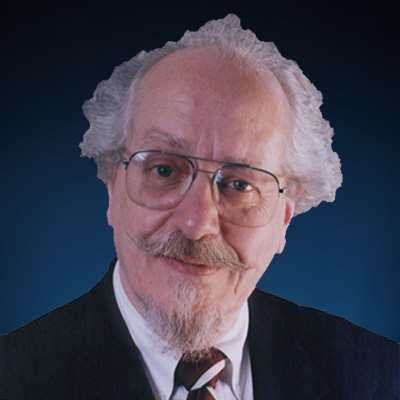
UIC Distinguished Professor, Electrical and Computer Engineering
Distinguished professorship awarded: 2009
Piergiorgio L.E. Uslenghi received a Laurea degree (summa cum laude) in electrical engineering from the Polytechnic of Turin, Italy, and MS and PhD degrees in physics from the University of Michigan. He was a research physicist at the Radiation Laboratory of the University of Michigan from 1963 to 1970 and has been a faculty member at the University of Illinois Chicago since 1970. He retired in 2013 and is presently a distinguished professor emeritus in the Department of Electrical and Computer Engineering and a part-time associate dean.
Dr. Uslenghi has published extensively on electromagnetism, microwaves, antennas, scattering, novel electronic materials, optics, and applied mathematics. He served as president of the Antennas and Propagation Society of the Institute of Electrical and Electronics Engineers (IEEE) in 2001, and as chair of the U.S. National Committee of the International Union of Radio Science (URSI) from 2006 to 2008. He was elected vice president of URSI for two terms, from 2011 to 2014 and from 2017 to 2020. He was editor-in-chief of IEEE Transactions on Antennas and Propagation and of Electromagnetics and the founding editor-in-chief of IEEE Antennas and Wireless Propagation Letters (AWPL). He also is the founding editor-in-chief of URSI Radio Science Letters, an online journal that began publication in 2019.
Dr. Uslenghi is a member of the Phi Beta Kappa and Sigma Xi honorary societies, a distinguished alumnus of the Polytechnic of Turin, a fellow of URSI, a fellow of the EMP, a life fellow of the IEEE, and a recipient of the IEEE Third Millennium Medal and the IEEE Antennas and Propagation Society Distinguished Achievement Award. He was inducted into the Academy of Sciences of Turin, Italy, in 2003, and was named University of Illinois Scholar in 2006 and Distinguished Professor in 2009. In 2008, the IEEE board of directors approved the IEEE Piergiorgio L. E. Uslenghi Prize Paper Award, a prize funded by the IEEE Antennas and Propagation Society, to be given yearly to the author of the best work published in AWPL. In 2019, he was elected an honorary lifetime member of the U.S. National Committee of URSI.
Dr. Uslenghi continues to be actively involved in research and guidance of graduate students and in the teaching of online courses. He is responsible for online education and international programs in the UIC College of Engineering.
bio
UIC Distinguished Professor, Mechanical and Industrial Engineering
Distinguished Professorship Awarded: 2006
Dr. Alexander Yarin earned his MSc in 1977 in applied physics from Polytechnical Institute, Leningrad (Sankt-Peterburg), Russia, and his PhD in physics and mathematics in 1980 from the Academy of Sciences of the USSR, Moscow, from which he also earned a DSc in physics and mathematics in 1989.
He was affiliated with the Institute for Problems in Mechanics of the Academy of Sciences of the USSR, Moscow, from 1977 to 1990. He became a professor at the Technion-Israel Institute of Technology from 1990 to 2006, holding the title of Eduard Pestel Chair Professor in Mechanical Engineering from 1999 to 2006. Dr. Yarin then came to UIC, where he has been a Distinguished Professor since 2006.
Dr. Yarin is a fellow of the American Physical Society and the author of five books, 12 book chapters, 354 research papers, and 10 patents. He was a fellow of the Rashi Foundation and The Israel Academy of Sciences and Humanities, and he was awarded The Gutwirth Award, The Hershel Rich Prize, and the Prize for Technological Development for Defense against Terror of the American-Technion Society. He is one of the three co-editors of the Springer Handbook of Experimental Fluid Mechanics, published in 2007, and he is associate editor of the journal Experiments in Fluids.
bio

UIC Distinguished Professor, Computer Science
Distinguished professorship awarded: 2013
Philip S. Yu is an American-born computer scientist. He received his PhD degree in electrical engineering from Stanford University.
Dr. Yu joined the University of Illinois Chicago in 2008 after a successful career at IBM T.J. Watson Research Center. He is a fellow of the ACM and IEEE.
Dr. Yu was appointed University Distinguished Professor in 2013. He has published more than 1,000 journal and conference papers with more than 10,000 citations and an H-index of 155, and he holds more than 300 patents. His research has received continuous funding support from numerous federal and industrial sources. His current research interests focus on data science, big data, data mining, and social network analysis.